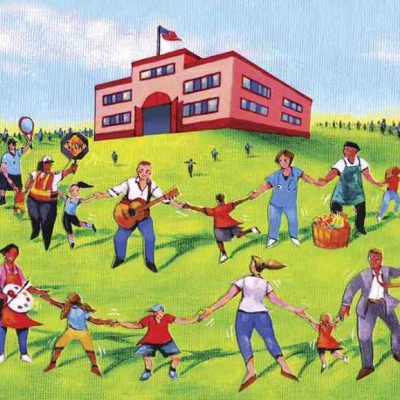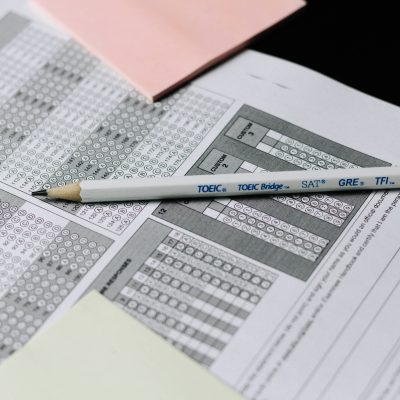Same blood, own soul
“En el nombre de Jesus. Amén.” I open my eyes to the same setting from before I closed them. The tall, small, black plastic table, made to last a family 12 years, is still here. The hazelnut-colored beans that stood on top of the steaming rice are still there, too. I swiftly grab my spoon and perform the crescent movement of air-plate-air, then mouth. After four scoops of the basic Latino dish, “Arroz y Frijoles,” my dad clears his deep voice from scarfing his plate.
“Sophia, your mother and I are very happy that after all your studying on the SSAT, you got into Dexter Southfield.” I look at my sister, two years younger than me, who holds a gleeful 11-year-old grin. It’s contagious, catching on to me as a smile. After remembering her study all summer for the test, I couldn’t be more proud of her accomplishment.
My father continues, “But when you get in, I want to see A’s. Your mother and I are paying for you to go to school so that you can get the best grades and experience. It’s not fair to your mother and I.” I turn my head to where my mother is sitting and glance at her hands. Familiarly, they were cracked and painted with callouses, previous burns, and cuts. I knew how her hands became that way — those hands came here from Brazil when her mother was sick, and rice past its expiration date was the only food on the table. Those hands came from a 16-year-old who dropped out of high school to come to America for money. Those hands came from her unending love for her children; she would not let them starve like she did. It was those hands that cleaned and cooked for multiple houses so she could give my sister and I the comfort that she didn’t get.
I look from her hands back to my plate with a sense of duty and responsibility. Although my parents were not speaking to me, they would expect no different when I changed schools in a year. “There is no way I’m not going to get A’s,” I thought. “It’s not fair to them and to how hard they work to send me to school. I will do everything I can to make sure I get A’s to make their hard work worthwhile.” I continue eating my now-cold rice and beans and leave the future me to deal with the promise I made to myself. I wish I took the saying “time flies” to heart, because, quickly, a year passed.
“Daniel!” My mom calls, in a manner that would sound like a yell to the normal ear. But after years of hearing this yell, it’s like she knocked at my door and quietly asked for me. I chase the echo of her voice from my room to the kitchen to see my parents standing near each other. The black table has reached its 13th birthday, with cuts on its sides and a shortened leg. “What happened, Daniel?” My mom asks, with less of an understanding tone more of one wondering if I slept through my classes.
I don’t respond. I still look at her hands — they’re the same cracked hands that they were a year ago. My dad already told her my first quarter grades after they closed, and a bold physiognomy of disappointment and shock was the only thing her energy could give. The last things she whispered before my father had his say was, “C’s, Daniel. I don’t believe it.”
Questions were all I took away from the scolding. “My mom and dad are working very hard to send me to school,” I thought to myself. “How could I disappoint them? How could I hurt my mother with these grades? Will I become like my mother, cleaning toilets and floors for other people? Am I a failure? Am I my mother, or am I myself? Wait, who is myself? WHO AM I?” I questioned my identity — whether I was destined to follow the path my mother took, or be what she wanted to be. I spent months running from trying to find who I was, but at the same time, I started letting my grades fall. I only really started to think about my identity when COVID-19 spread its name to the world.
I lay in my bed, staring at the ceiling and wondering, “What makes me different from the blood of my family?” I kept thinking about my mother’s past of poverty and hardship that led her to where she and I are today, which made me believe that I was different from my mother by circumstance and by my soul. My mother had parents who didn’t love each other, and who lived in poverty. I have it easier with parents who not only love each other, but me, as well. The love that I get from my mother makes me different. I also realized, though, that I carry something that weighs more than money and cannot be replaced — a soul. No matter how similar my blood may be to my family’s, they do not control my decisions, thoughts, and actions. For every single moment in my life, I stood behind my actions. I don’t have to worry about who I have to be or what I may be; I have to focus on who I want to be. I am not my mother, or a failure. I am my irreplaceable self.
It’s been months since that time of meditating on who I am. Self-acceptance was not an easy mentality to obtain as my mind was accustomed to the identity of failure, especially when my grades, which consisted of effort-filled C’s, came to my mother. However, I am blessed to be surrounded by friends and other family members, who remind me of my uniqueness through their positivity. My mother and I never act like strangers to one another as we laugh and talk about life when the opportunity presents itself, but we stay away from the subject of academics as it remains a sensitive topic for us both. Now, she is trying to overcome her past by talking to a therapist while I do the best I can to show her love to help her appreciate the person she currently is. The future of my life is a mystery, like a painter with constantly changing inspirations for his craft. However, the flowing present will remain with the certainty of my value and identity. After all, I’m an irreplaceable soul with an irreplaceable, unpainted future ahead of me.










